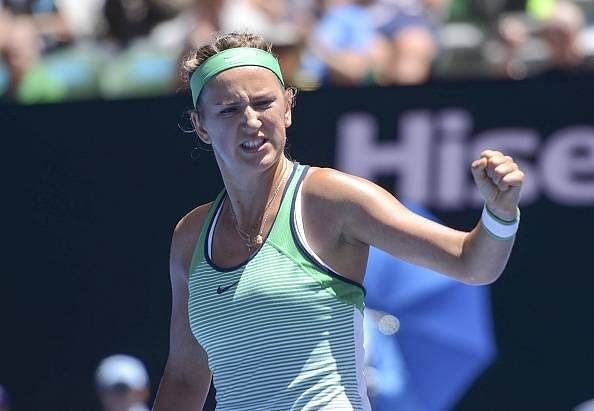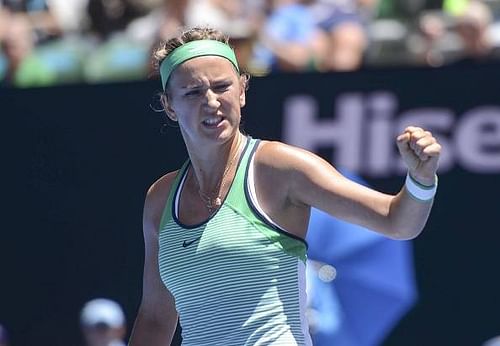
Australian Open diary: Victoria Azarenka shows just how lonely and difficult it is at the top

There's a reason behind the unbridled intensity of Victoria Azarenka's on-court demeanour
Tennis players are rich, famous and fabulous. They shouldn't have any insecurities or deep-rooted fears, right?
Just a few moments of interaction with the pros can tell us how far away from the truth that statement is. A tennis star, or a super-successful professional from any other field for that matter, can be as lonely and vulnerable as the weakest of us – if not more.
They are always under the spotlight, always being scrutinized, always getting judged – this, despite the fact that they have a million personal problems of their own, which they struggle to keep under wraps. And remember, some of the top stars are just out of their teenage years.
Even the press conference room at the Australian Open is designed in such a way that it can intimidate any player not accustomed to the attention. The player dais is at the front of the room, in the centre, while the mediapersons are seated all around that platform in raised seats, much like in an amphitheatre. All eyes are on the player at all times, and there's no escape.
It's one thing to be hitting shots on a court with spectators seated all around you. But it's a whole different ball game to be surrounded by an army of inquisitive journalists looking down upon you and subjecting you to a barrage of questions designed to pry out every last detail from your inner mind. How do you not snap and have a melt-down, especially if you're coming into the room after a loss?
The pros always maintain their composure and answer every question asked of them with a straight face, something that they don't get nearly enough credit for. And Victoria Azarenka was thoroughly amiable and eloquent in her presser today, but with each question she answered she made us a little more aware of how difficult her life really is.
She started out by stressing on the importance of execution and blocking out all other distractions – the scorelines, the competitors’ results, her own past performances. She talked about working hard on the psychological aspect of the game, and about watching documentaries on the lives of JJ Watt and Kobe Bryant to become mentally tougher.
She also talked about pressure, which is when the entire room went silent for a moment, contemplating the sobering thought of what it really takes to become a tennis professional.
The moment came when a reporter said, "You've said that the pressure that you felt when you were younger in Belarus was more than (that of) playing in a Grand Slam. Can you give a little more insight into that? What did that pressure feel like, look like – any specific examples?”
“Well, the first pressure is that, if you don't win some tournament, you have absolutely no opportunity to go to any other. If you're not the best, you don't get sponsored at all. That was pretty rough,” answered Azarenka.
That itself set the emotions rolling among everyone who listened. What kind of career makes it necessary to be the best for you to earn any kind of reward? Can we imagine not graduating from school if we failed to be the best student in our class? How would a world where only the best employee gets paid be a world that stays whole?
But Azarenka wasn't done yet. “I remember this one day, it comes back to me every time. I was travelling for nine weeks, and you know, in the juniors you play one or two matches a day, and you have to play at a certain time. If you skip lunch, you don't get to eat. I had no money, I didn't get to eat. So that was pressure, you know, to survive. That was survival.
“So the pressure right now is to go out there and face a big opponent? That's, okay. But when you're, like, hungry and you gotta go play and you have absolutely nothing, that is big pressure.”
I must confess I was stunned for a moment when I heard Azarenka say those words. She actually had to go hungry because she didn't have the money to buy lunch? And all because she was too busy playing a tennis match which, by the way, she had to win to have any hope of playing the next tournament?
Suddenly, all of it made sense. The unnerving intensity that Azarenka displays on the court, the never-say-die attitude, the tears of dejection when she loses – for her, tennis is life and winning means survival. Everything else is secondary, and anything short of a trophy is a crushing disappointment.
And yet, we give her a hard time for dating Redfoo and grunting too loudly on the court. How does any of that compare to what she has endured, and what she continues to endure, by choosing to be a tennis pro?
Azarenka is not the only player with baggage, of course. The early life struggles of Ana Ivanovic and Novak Djokovic have been well-documented, as have the difficult times of Venus and Serena Williams. All these players have moved mountains to reach where they are today, and yet at the end of the day we get upset when they refuse to answer a question or if they speak a little less politely with an official.
Even for players who haven't had to deal with the misfortune of poverty or injustice, life as a pro is no bed of roses. It's a harsh and demanding world out there, and any mis-step could result in another person taking your place. And to think that they deal with all this right from their teenage years.
As I walked on to a court later where Nick Kyrgios was playing (and as usual throwing a tantrum), I overheard a spectator say to his friend, “Kyrgios really needs to stop with this nonsense. He's being a child.” His friend was quick to reply, “But he IS a child; he's just 20! Were YOU the most well-behaved and professional person in the world when you were 20?”
I'm not condoning any of Kyrgios’ past misdemeanours, but it's hard not to see the wisdom in that comment. It's lonely and difficult out there in the professional tennis world, and Azarenka for one is a credit to the sport with her unwavering professionalism and undying passion.
If tennis is life, then Victoria Azarenka is its most admirable survivor.